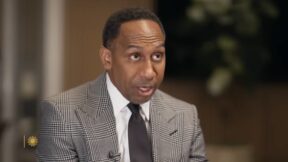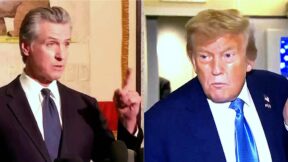WATCH Chris Wallace Confront Tyler Perry Over Criticism of Madea Character: ‘Spike Lee Called It Coonery Buffoonery’
CNN anchor Chris Wallace confronted filmmaker and media entrepreneur Tyler Perry with the oft-lobbed criticism that his Madea character promotes negative stereotypes, and cited Spike Lee‘s description of Perry’s portrayal as “coonery buffoonery.”
Wallace’s series Who’s Talking to Chris Wallace debuted on HBO Max this week, and the first batch of episodes features an in-depth interview with Perry.
In one riveting portion of the interview, Perry opened up to Wallace about the abuse he suffered at the hands of his father, and praised his mother’s role in his success:
WALLACE: When you look at that, little boy that’s you five, what do you think? What do you what do you say, from this vantage point to that about your five year old self?
PERRY: That’s that’s hard for me to look at my kid, I look so much Jesus, I look so much like my son. The great thing about having a child now seven year old is I get to say all those things that I didn’t get to say to, to my younger self, so I feel like it’s helping to heal a lot of wounds.
WALLACE: Have you come to terms with the fact that you didn’t get that from your father? Or is it still an open wound?
PERRY: I’ve come to terms with it and but the beauty of it is having my son I’m telling you every time I say I love him, I feel, I feel that being said to the little boy in me.
PERRY: My father often, he sent a message to me a few years ago through my brother saying, if I beat your ass one more time, you would be Barack Obama, meaning that he thinks that his abuse brought me to success. But he totally negates the love of my mother. And the love of my mother is what brought me here. It wasn’t the abuse. It wasn’t the rage and the anger. It was her love that brought me to this place.
Mr. Wallace also asked Mr. Perry about a well-trod topic: the aforementioned criticism exemplified by Mr. Lee’s 2009 comments, which he made in a 2009 interview with Black Enterprise. Perry once again defended his work:
WALLACE: Let’s get this out of the way. You had to deal with this at some point. When Madea first started first came out, uh Spike lee called it “coonery buffoonery.” And and over the years have been a number of people who say that you’re playing with negative stereotypes of black men and black women.
PERRY: Emasculating black man, I’ve heard it all. Yeah.
WALLACE: How do you respond to that?
PERRY: There’s a certain part of our society, especially black people in the in the culture that they’re they look down on certain things within the culture.
For me, I love the movies that I’ve done because they are the people that I grew up with that I represent and they, like, my mother would take me in the projects with her on the weekends, she played cards with these women. Most of them have 12th grade education, but their stories and how much they loved each other and how when they get sad about something and others would come in and make a joke. I’m five years old on the floor with my Matchbox cards. I was in a masterclass for my life. So when someone says this is this your your harkening back to a point of our life that we don’t want to talk about it. We don’t want the world to see you’re dismissing the stories of millions and millions of black people. And that’s why I think it’s been so successful because it resonates with a lot of us who know these women in these experiences and uncle joe and so on and so forth. But it also goes back um the Harlem renaissance and Langston Hughes and Zora Neale hurston, Langston Hughes said that Zora Neale hurston was a new version of the Darkie. Langston was northern, very sophisticated, Zora Neale from the South. Her character spoke in a southern dialect. So this is this is a conversation that’s been going on long before Spike lee and Tyler Perry. It is what it is. But what is important to me is that I’m honoring the people that came up and taught and and and made me who I am.
Watch above via HBO Max and CNN.
New: The Mediaite One-Sheet "Newsletter of Newsletters"
Your daily summary and analysis of what the many, many media newsletters are saying and reporting. Subscribe now!






Comments
↓ Scroll down for comments ↓